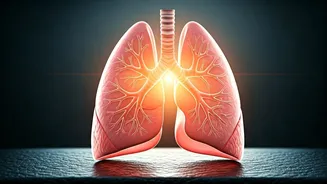Sugary Drinks And Your Lungs
Sugary beverages, often consumed without a second thought, can pose a threat to your lungs. High sugar intake is linked to increased inflammation throughout
the body, including the respiratory system. This inflammation can exacerbate conditions like asthma and other breathing difficulties. These drinks, including soda and fruit juices with added sugars, should be avoided. The excess sugar can promote weight gain, which indirectly puts pressure on the lungs, making breathing harder. Replace them with water, herbal teas, or naturally flavored beverages to promote overall well-being and lung function.
Processed Meats: A Risk
Processed meats, often convenient choices, are known to contain nitrates and nitrites. When consumed, these substances can trigger inflammation within the body, potentially impacting the respiratory system. The additives used in these meats, such as bacon, sausages, and deli meats, can irritate the airways and worsen conditions like asthma. Moreover, these processed meats are often high in saturated fats and sodium, which can lead to weight gain and fluid retention. The increased weight can restrict lung capacity, making breathing more strenuous. Limit the intake of processed meats and opt for lean protein sources, such as chicken, fish, and beans, for improved respiratory health.
Deep-Fried Foods: Trouble Ahead
Deep-fried foods, beloved by many, can bring significant trouble to your lungs. The high oil content and the process of frying produce inflammatory compounds that can irritate the airways. These foods, like French fries and fried chicken, are often linked to increased mucus production. This can lead to congestion and make breathing difficult. The saturated and trans fats found in deep-fried foods can contribute to weight gain, also putting extra pressure on the lungs. For better respiratory health, reduce the consumption of deep-fried items. Instead, choose baked, grilled, or steamed alternatives to keep your lungs healthy.
Dairy Products: Proceed Cautiously
Dairy products can have a noticeable effect on respiratory health for some individuals. While not a problem for everyone, dairy has been known to increase mucus production in sensitive individuals. This can cause congestion, making it harder to breathe. Some people also have sensitivities or allergies to the proteins found in milk products, which can trigger inflammatory responses within the lungs. If you notice an increase in mucus or other respiratory symptoms after consuming dairy, consider reducing your intake. Explore non-dairy alternatives, such as almond, soy, or oat milk, to see if it improves your breathing.
Excess Salt: Breathless Moments
Excess salt consumption can indirectly impact lung function. High sodium intake leads to fluid retention, which can cause swelling in various parts of the body, including the lungs. The increased fluid volume can make breathing more difficult and reduce lung capacity. Foods like packaged snacks, fast food, and canned goods often contain high levels of sodium. It's important to monitor your sodium intake and opt for fresh, unprocessed foods. Also, season your meals with herbs and spices instead of salt, and stay hydrated to help your body manage fluids effectively and support respiratory health.
Artificial Sweeteners and Your Lungs
Artificial sweeteners, often found in diet foods and drinks, have raised health concerns. Some studies suggest a potential link between these sweeteners and respiratory problems. Although the exact mechanisms are still being explored, some artificial sweeteners can disrupt the gut microbiome, leading to inflammation that affects the lungs. The long-term effects of regularly consuming artificial sweeteners are not fully understood. It's wise to limit or avoid products containing these sweeteners. Choosing natural sweeteners like honey or maple syrup in moderation could be a healthier choice for supporting overall respiratory health.
Alcohol: An Irritant?
Alcohol consumption can negatively impact your respiratory health. Alcohol can irritate the airways and make you more susceptible to respiratory infections. It weakens the body’s defenses, making you more prone to colds, the flu, and pneumonia, all of which can affect your lungs. Moreover, certain alcoholic beverages contain sulfites, which can trigger asthma symptoms in sensitive individuals. Drinking alcohol can also lead to dehydration, which can thicken the mucus in your airways, making it harder to breathe. Moderate or avoid alcohol to ensure your lungs stay in top shape.




















